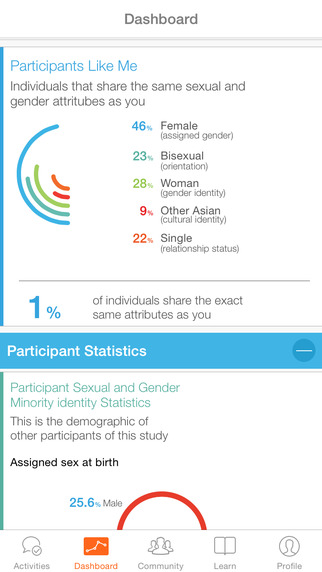 UCSF's PRIDE Study
UCSF's PRIDE Study
The National Institutes of Health has awarded UCSF $9.75 million to develop a platform, over the next five years, that researchers can use to conduct digital health studies. This platform, called Health ePeople, will provide researchers with access to a large group of volunteers that have agreed to participate in research and the infrastructure to collect participant health data through mobile and wireless technologies.
“The primary goal of Health ePeople is to provide a resource enabling convenient and efficient mobile and wireless health research,” a co-principal investigator, Jeffrey Olgin, who is also a professor of medicine and chief of cardiology at UCSF, said in a statement. “It will help investigators collect mobile health data via integration with sensors, devices and apps, deliver online surveys, connect with external data sources including electronic health records, and use novel methods for ascertaining and adjudicating clinical outcome events.”
UCSF received these funds in part because of the success of UCSF's existing digital health venture, the Health eHeart Study, which leverages mobile health apps and connected consumer medical devices in an effort to eventually track and monitor 1 million people in real-time. Since launching in 2013, the venture has enrolled more than 30,000 participants.
The tech capabilities of the Health eHeart study have grown in the past few years. Researchers have added a number of new features including a user-friendly interface to collect patient-reported data, modular electronic consenting for participants, a study management portal that connects to a dashboard, and a flexible messaging system.
A Health ePeople co-principal investigator and director of clinical research in the UCSF Division of Cardiology, Gregory Marcus, explained that given the research backgrounds of the principal investigators, their initial emphasis was on cardiovascular disease. But since then, Marcus said his team realized the infrastructure UCSF created with this project could be applied to tracking other health factors including diet, physical activity, geolocation, and smartphone use patterns.
External investigators that focus on other health conditions, including researchers from urology, obesity, pulmonary transplant, neurology, and oncology have used Health eHeart's infrastructure to create their own research protocols.
Helath ePeople will collect data from patients enrolled in the Health eHeart Study and from participants recruited externally. Researchers working on the platform will also consult advisory groups about data standards, technology, research, participation, ethics, and business, and will partner with other digital health-focused projects, including the federal Mobile Sensor Data-to-Knowledge (MD2K) Center of Excellence, the non-profit Open mHealth, and the NIH Precision Medicine Initiative.
“We are really excited to develop products that researchers can use to do mHealth-related research more efficiently and effectively,” Mark Pletcher, professor of epidemiology and biostatistics and director of the Informatics and Research Innovation Program at the UCSF Clinical and Translational Sciences Institute, said in a statement. “We plan to develop a spectrum of different options for investigators to use for their research, including full-service, web-based intervention systems to simple data collection ‘modules’ that can be plugged into existing web resources.”
UCSF said the platform won't be ready to enroll new participants for several months, but people who want to participate in the cohort can sign up through the Health eHeart Study. Once the platform is ready, participants will be given the option to transfer.
The platform UCSF is building is similar to Apple's ResearchKit, an open source platform that helps researchers build medical apps and recruit patients for clinical trials. In June, UCSF launched a longitudinal study of lesbian, gay, bisexual, transgender, queer (LGBTQ) and other sexual and gender minority (SGM) adults on this platform to examine how their sexual orientation affects their health. The study is called PRIDE and stands for Population Research in Identity and Disparities for Equality.















